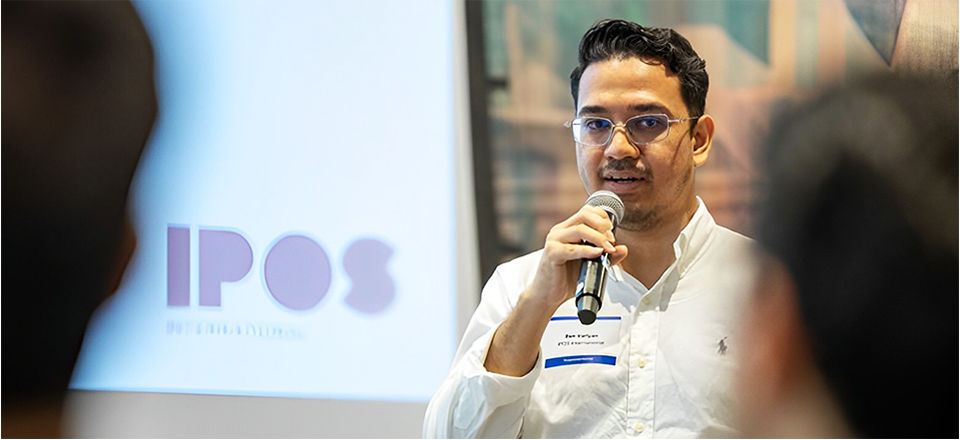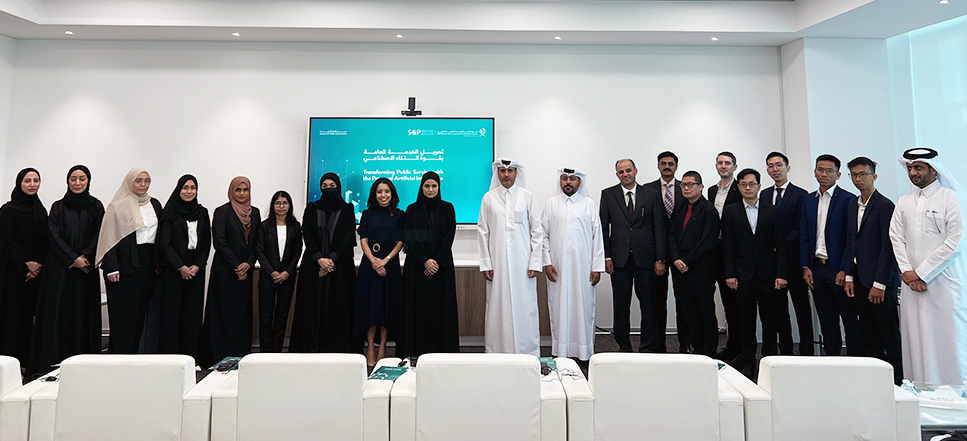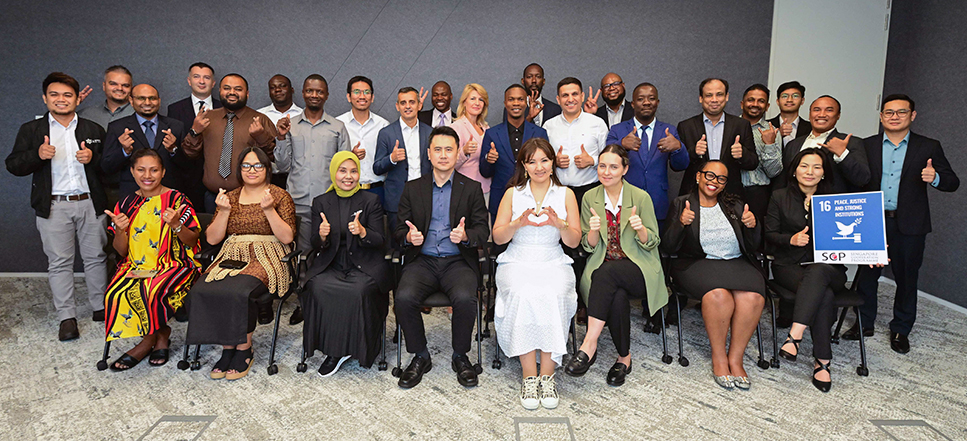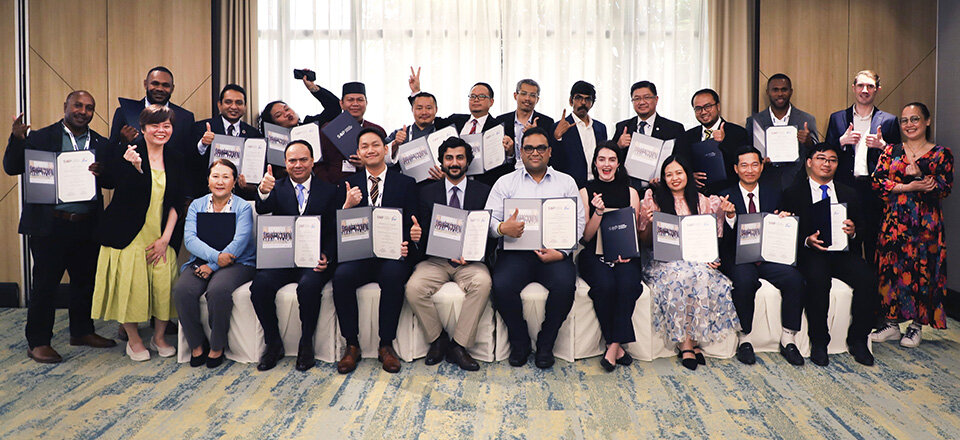
MFA x JSPP21 2025 – Fostering the Digital Economy through Artificial Intelligence and Data Governance

(Pictured above) IPOS International team with 21 senior government officials from across ASEAN, Oceania, and the Indian subcontinent celebrating the successful conclusion of the MFA-JSPP21 programme.
Executive Summary
From 17-21 February 2025, Singapore’s Ministry of Foreign Affairs, in collaboration with the Japan-Singapore Partnership Programme for the 21st Century (JSPP21), delivered an impactful programme titled "Fostering the Digital Economy through Artificial Intelligence and Data Governance." Curated by IPOS International, the five-day intensive course brought together 21 senior government officials from across ASEAN, Oceania, and the Indian subcontinent. The programme addressed critical global challenges in data governance, intellectual property (IP) protection, and harnessing AI to propel sustainable economic growth.
Building Digital Governance Capacities for Tomorrow’s Economy
As nations globally navigate an increasingly AI-driven landscape, balancing economic opportunity with robust governance frameworks has become crucial. Opening the programme, Ms Tay Soh Hui, Head of Programmes at IPOS International (Academy), aptly captured the programme's objective: "Artificial intelligence presents enormous potential for economic growth, but it also introduces significant challenges in protecting privacy and IP rights. We aim to equip policymakers with effective tools and insights to meet these challenges confidently."
Representatives from Brunei Darussalam, Cambodia, Indonesia, Philippines, New Zealand, Papua New Guinea, Tonga, Bangladesh, Bhutan, India, and Pakistan brought diverse and insightful perspectives that fostered dynamic exchanges and mutual learning.
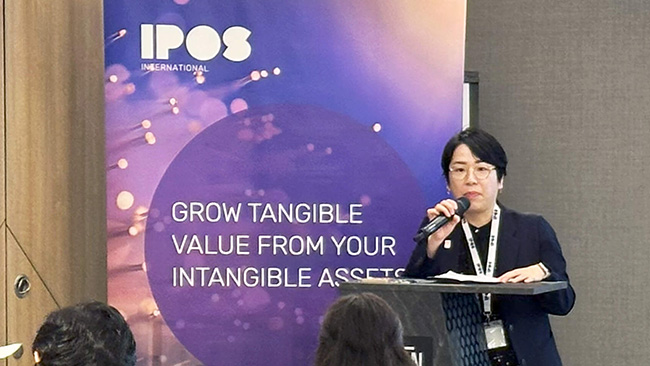
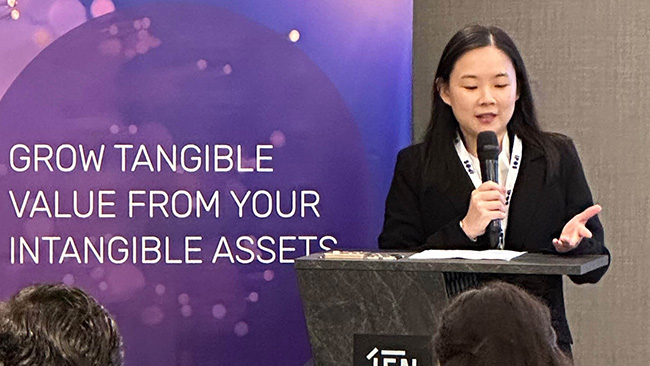
Captions 01 & 02: Ms Yukako Ito, Counsellor, Embassy of Japan in Singapore and Ms Tay Soh Hui, Head of Programmes at IPOS International (Academy) delivering their compelling opening address on balancing AI innovation with robust governance frameworks
Connecting Theory to Practice
The thoughtfully structured curriculum merged academic theory with practical insights across four thematic pillars:
Digital Economy Foundations
Associate Professor Guan Chong [Director, Centre for Continuing & Professional Education. Singapore University of Social Sciences (SUSS)] set the stage with a detailed overview of the regulatory landscape, highlighting essential considerations for countries at varied development stages.
Blockchain and Fintech Innovations
Participants explored insights on blockchain's transformative potential with Mr Branson Lee [Director of Alice Foundation] and Associate Professor Ding Ding [Dean, School of Business, SUSS]. Assistant Professor Purnima Murali Mohan [Infocomm Technology, Singapore Institute of Technology (SIT)] expanded discussions to include fintech's critical role in economic inclusion and skills development.

Caption 03: Mr Francis Zhang (PDPC Singapore) captivating participants with Singapore's progressive approaches to data protection, cross-border flows, and AI governance principles.
AI Governance Frameworks
In-depth sessions led by Mr Derrick Yuen [Founder and Principal Consultant, FYT Consulting Pte Ltd] and Mr Francis Zhang [Deputy Director, Policy & Technology, Personal Data Protection Commission (PDPC) Singapore] showcased Singapore's sophisticated approaches to data protection, cross-border data management, and AI governance. Complementing these, Professor Yuasa Harumichi [Graduate School of Governance Studies, Meiji University] provided valuable comparative insights from Japan’s governance model, enhancing participants’ understanding of international best practices.
Ms Sesilia Esta Fahiua from Tonga highlighted the session's practicality, remarking: "Singapore’s approach to AI governance is very interesting. It gives me insights to help my home country with developing a reliable AI Governance framework."
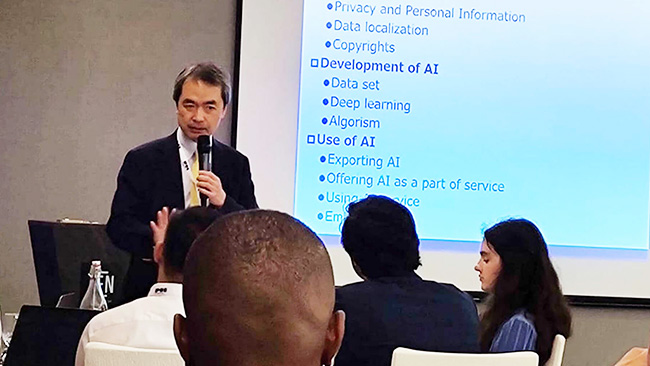
Caption 04: Professor Yuasa Harumuchi (Meiji University) offering valuable Japanese perspectives on AI governance, enriching participants' understanding of international best practices.
Emerging AI Technologies and IP Protection
Associate Professor Donny Soh [Programme Leader, Bachelor of Science with Honours in Applied Artificial Intelligence, Singapore Institute of Technology (SIT)] and Mr Takayuki Semitsu [Researcher, AI Safety Institute (AISI)] led engaging discussions on the latest trends in AI technology, while Mr Paul McClelland [Head of Legal and Faculty Member, IPOS International] tackled vital IP issues in the digital age, emphasising practical regulatory strategies for protection and enforcement.
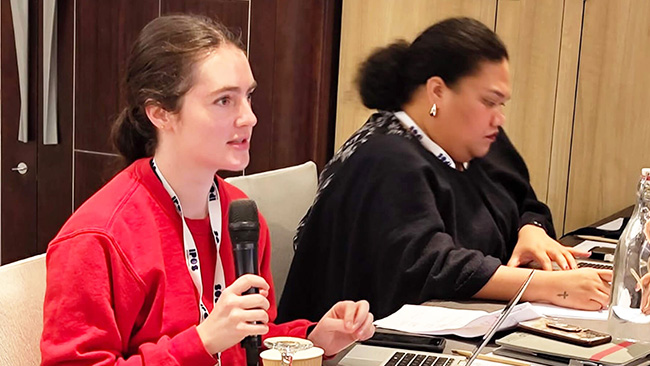
Caption 05: New Zealand representative Ms Ella Mary Arnst actively engages in dynamic dialogue with programme speakers, exemplifying the programme’s collaborative spirit.
Immersive Field Experiences Beyond the Classrooms
Participants benefited from hands-on experiences through curated learning journeys that showcased Singapore's leadership in digital innovation:
- Singapore Polytechnic's Data Science & Analytics Centre:
Attendees gained exposure to advanced data analytics in action, witnessing how Singapore cultivates digital talent.
Indonesian participant Mr Arman Gunawan remarked, “The explanation and practical use case of AI is very well explained and demonstrated.” - Monetary Authority of Singapore's MAS Gallery:
Participants explored Singapore’s progressive fintech landscape, understanding strategic innovations and regulatory frameworks fostering Singapore's prominence in global financial technology.
Programme coordinator Ms Yeo Li Sung noted the enthusiastic engagement, stating: “The participants were greatly impressed with Singapore’s digital infrastructure investments, prompting insightful dialogues and fostering deeper appreciation.”
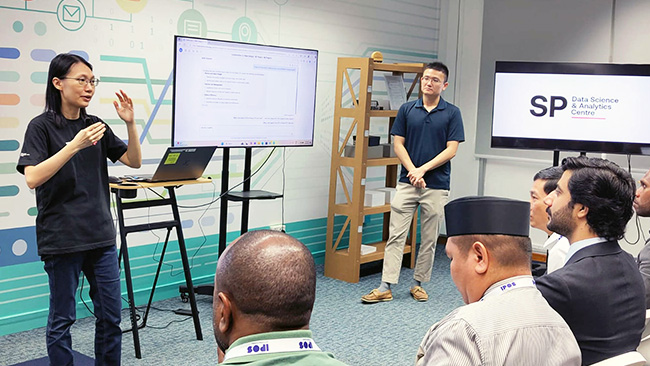
Caption 07: Participants experiencing hands-on AI applications at Singapore Polytechnic's Data Science & Analytics Centre, bridging theoretical knowledge with practical implementation.
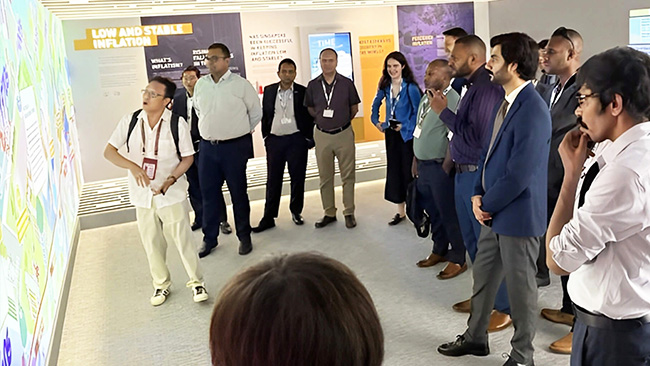
Caption 08: Participants gaining insights into Singapore's innovative fintech ecosystem during their immersive tour of the MAS Gallery, a showcase of regulatory excellence.
Cross-Cultural Exchanges and Collaborative Learning
A key highlight was the participant-led sessions sharing national AI and data governance strategies from their respective nations. These exchanges enabled participants to:
- Benchmark their national policies against regional and international practices
- Identify adaptable governance frameworks suitable for different development contexts
- Establish connections for future international collaborations
Class representatives Ms. Ella Mary Arnst (New Zealand) and Mr. Nasir Mahmood (Pakistan) underscored the value of these interactions during their concluding remarks, affirming the importance of continued regional cooperation.
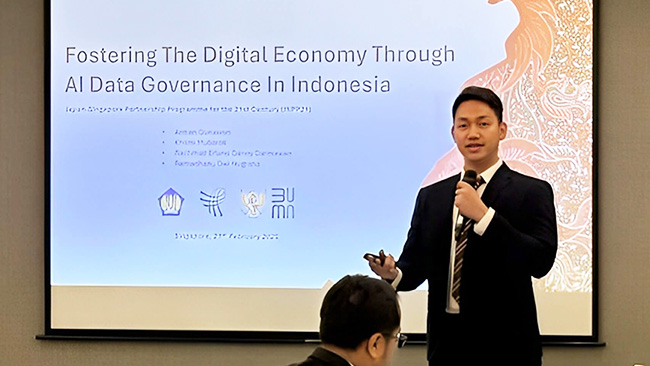
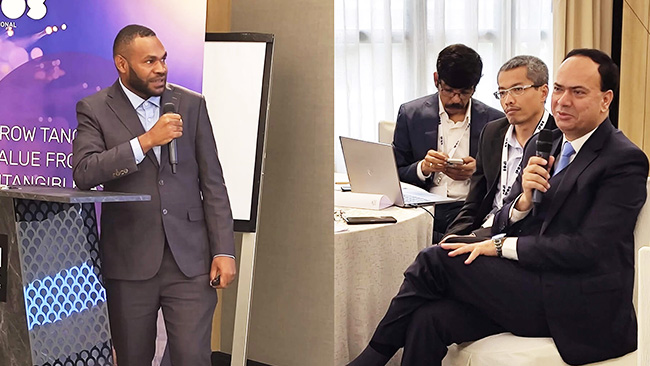
Captions 09 and 10: Government representatives sharing their nations' unique approaches to digital governance, sparking cross-border knowledge exchange.
Building Lasting Connections
Beyond academic and practical insights, MFA-JSPP21 facilitated meaningful professional connections. Social activities such as visits to iconic Gardens by the Bay and an official luncheon hosted by the Ministry of Foreign Affairs provided relaxed environments for deeper, informal discussions, cementing professional relationships and enhancing future collaborative potential.
Programme organisers observed, “The programme not only enriched participants academically but also built lasting friendships and professional bonds, crucial for future collaboration.”
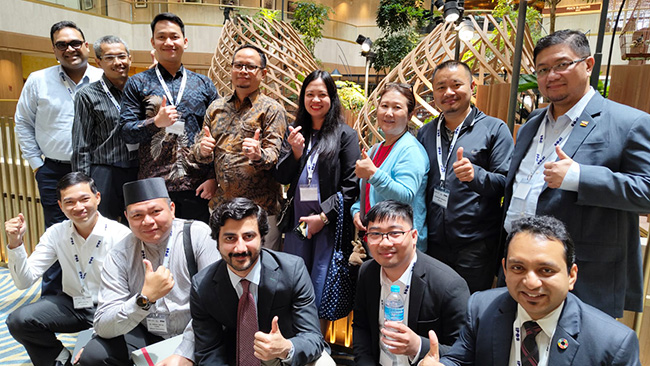
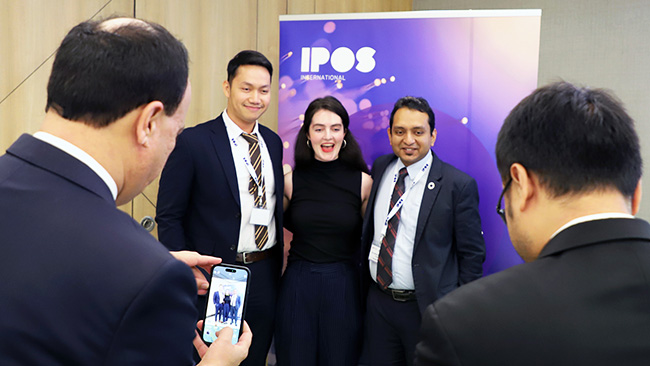
Captions 11 and 12: Participants forging valuable professional and personal connections, establishing foundations for continued regional cooperation in digital economy initiatives.
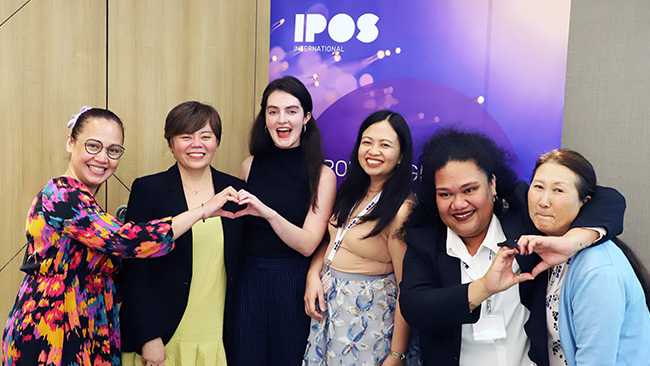
Caption 13: Programme coordinators Ms Dilpreet Kaur and Ms Yeo Li Sung (IPOS International) with beaming participants, marking the completion of their transformative journey in AI and data governance.
Join Us in Shaping a Sustainable Digital Future
MFA-JSPP21 highlights the power of international collaboration in navigating digital transformation. For information about future programmes or collaboration opportunities, please visit our website at www.iposinternational.com or reach out directly to our Academy team at enquiry.academy@iposinternational.com.
About the Japan-Singapore Partnership Programme for the 21st Century (JSPP21)
Since its establishment, JSPP21 has exemplified the shared belief between Singapore and Japan that human resource development is crucial for sustained economic and social progress. Originating from a 1994 Memorandum of Understanding, this partnership has evolved to foster training and capacity-building for third countries in the fields of (a) security and peace, (b) addressing vulnerability, (c) private sector development, (d) connectivity, and (e) smart initiatives.
To date, close to 400 training courses have empowered more than 7,000 participants in diverse fields, fostering regional integration and sustainable development.
